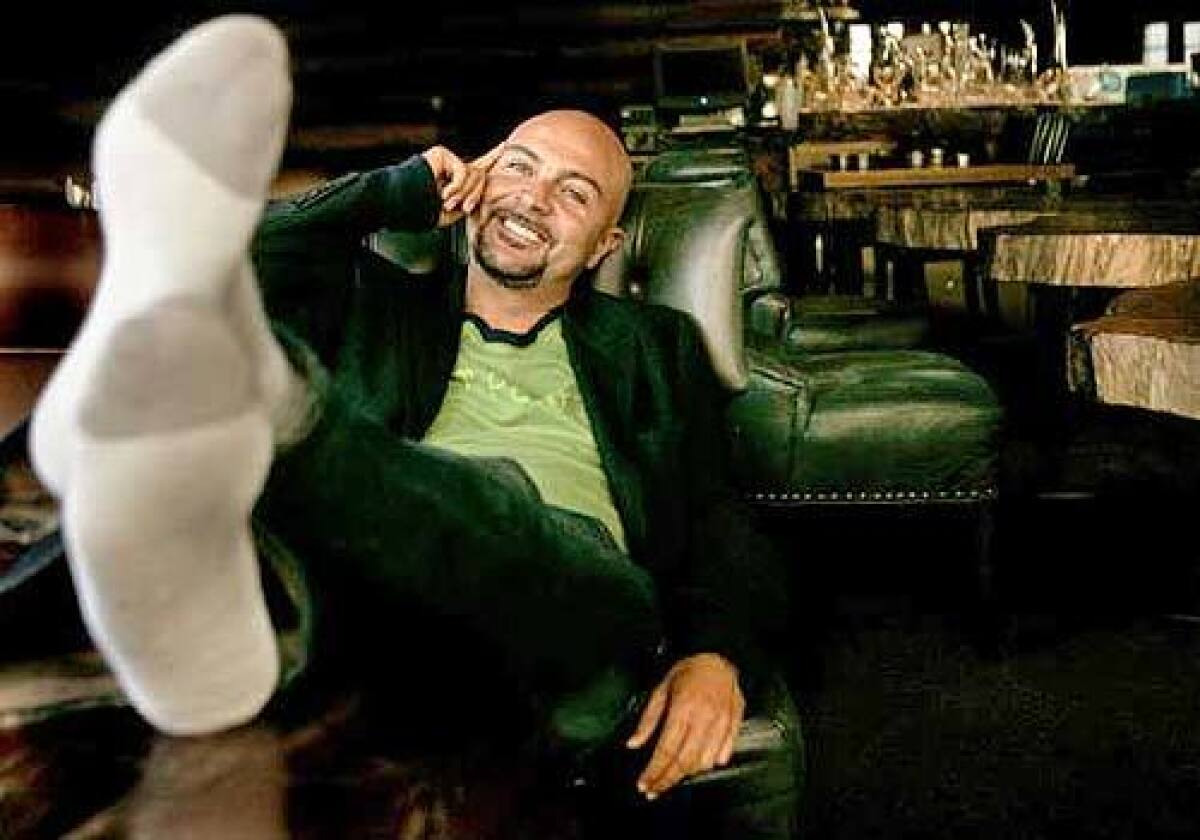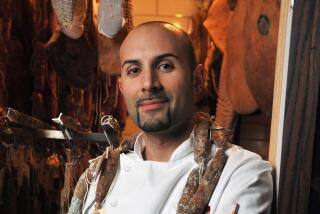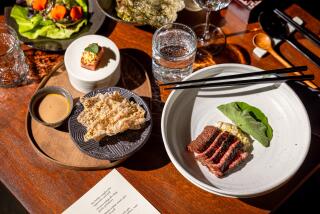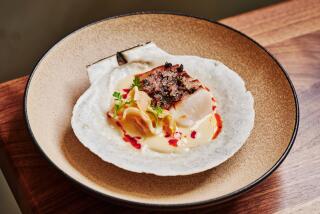Scene and be seen

“NEVER, never let a chef design the menu. They’ll make the food too complicated.” Such is the wisdom of Adolfo Suaya, an impresario who is changing the landscape of the Los Angeles restaurant scene. Thanks to Suaya and the restaurateurs with whom he’s been associated, the Hollywood hotspot is suddenly as much a part of the entertainment industry as, well, paparazzi.
FOR THE RECORD:
Restaurant investors —An article in Wednesday’s Food section about entertainment industry professionals investing in Los Angeles restaurants said Lonnie Moore and Mike Malin were general managers of Dolce Enoteca e Ristorante. They are the owners. Also, the article said a building housing the Geisha House restaurant was among the properties owned by Adolfo Suaya. It is not.
Dolce Enoteca e Ristorante. Geisha House. The Lodge. Sushi Roku. Newcomers Bella Cucina and Memphis. You probably wouldn’t even think of them as belonging to a genre unless you knew how these places were conceived. Financed by young Hollywood producers, agents and actors eager to own a slice of the city’s nightlife, these restaurants are all about the scene, which has to be glittering. The food must be decent, but it can’t draw attention to itself or be too challenging. The Hollywood clientele that the investors are eager to attract won’t go for it. Salads are good. Tuna tartare. New York strip steak. Sushi.
*
Hotspot heat source
HERE’S how it works.Say you’re an up-and-coming agent, and, like anyone in Hollywood, you need a place to entertain. You don’t have the deep pockets for a hillside mansion. But you do have $10,000 or $20,000.
So what do you do to get ahead in Hollywood? You invest in a restaurant.
You invite clients there, make your deals there or simply enjoy being special. In the restaurant, you’re on your own turf. In a town where $50,000 cars are de rigueur, it’s a relatively inexpensive way to look like a player.
It’s all about access to powerful people, says Carl Bressler, a former talent agent and restaurant investor. “You hear the gossip. You know who is in the restaurant, who is talking about you, and what they’ve said,” he says. Want to know who’s coming in that night? A discreet investor can look at the reservations.
And if the place is hot, you’re hot, because only investors can get the coveted 8 p.m. Saturday reservation. That’s the rule at Dolce and Geisha House. “When people can’t get into a hot restaurant, they can, [if they go] through you,” Bressler says. Those favors help you build relationships with people who can advance your career.
The concept isn’t new; Spago was financed by Hollywood money, as was the Grill on the Alley and Ago. What’s new is that Suaya has reduced it to a formula. He buys up real estate, selecting locations that appeal to the glitterati. Next he creates the concept. Then comes the designer. At first, Dodd Mitchell designed them: Dolce and Gaucho Grill in Brentwood. Lately, Suaya has been designing them himself. That’s the case with the Lodge, the upcoming Middle-Eastern restaurant Goa and Suaya’s future Hollywood steakhouse Charcoal.
Next comes the menu: When Dolce opened, the formula was lots of vegetables, fresh tomatoes and basil and grilled fish. These days, Suaya creates the menu himself. At the Lodge, that means steaks grilled straight up.
Then it’s time to pull together the financing. At most of these places, $10,000 or $20,000 buys a share. And there is no more valuable investor than a talent agent. “They need to entertain, they need to talk about where they are going, they need to be out,” Suaya says. When they invest, they become regulars, filling the tables with their Hollywood friends and clients.
“You hope it will be a hard-to-get reservation in a cool, hip place,” says Aaron Kaplan, worldwide head of the scripted television department at William Morris Agency and a Dolce investor. “Food is less of an issue.”
Finally, when everything else is in place, hire a chef.
Suaya and his real estate empire are connected with several restaurant management groups, including Dolce Group (Dolce, Geisha House, Bella Cucina), Innovative Dining Group (Sushi Roku, Boa, Katana) and Meridian Entertainment (Table 8, Scorpion). Another group created Falcon, Pearl Dragon and Voda, with more new restaurants to open soon; also there’s the group behind Lincoln Steakhouse, Ivar and Tengu.
Suaya came onto the L.A. restaurant scene in 1986 when he opened the first Gaucho Grill. An aspiring actor when he emigrated from Argentina four years before, he had a chain of 14 Gaucho Grills by 1996.
As real estate prices climbed in the late ‘90s, Suaya bought up commercial spaces he thought would make good restaurant sites. The list of failed concepts he created, including Fried Bananas and Antarctica, was balanced out by the success of a restaurant in which his involvement was limited to being the landlord, Sushi Roku on Third Street.
*
Partner in dining
NOW Suaya’s influence as a landlord or operator extends to 15 restaurants, including eight Gaucho Grills. Memphis and Bella Cucina, both in Hollywood, are the latest, and two more are on the way — Goa, an Indian/Middle Eastern/Moroccan fantasy he plans to create on Cahuenga Boulevard, and BlackSteel, an Asian-French fusion restaurant.The point is to create a place that appeals to Hollywood investors. That’s different than, say, Koi or Asia de Cuba or Social Hollywood. Those restaurants appeal to Hollywood players, but are owned by individual entrepreneurs.
And then there’s Table 8, a twist on the Hollywood investor formula. Suaya wasn’t associated with Meridian when it opened the Melrose Avenue restaurant. And he wouldn’t have approved when managing partners Chris Heyman and Joshua Woodward turned over the kitchen to well-known chef Govind Armstrong. Still, the partners had been able to attract the entertainment industry insiders Suaya coveted.
The restaurant opened in August 2003 to critical acclaim. With two sources of “heat,” Table 8 was a home run.”Table 8 didn’t start out as a Hollywood restaurant,” says Woodward, a film producer. Partner Heyman wanted to replicate his New York restaurant Match. “And I needed a place I could entertain,” he says.
“Everyone in the entertainment industry is looking to open a restaurant,” Woodward says. So right now, the most difficult part of the business is finding good locations.
And that’s where it pays to partner with Suaya, their landlord and partner in the nightclub Rok Bar, where rocker Tommy Lee is an investor. In another of Suaya’s Hollywood buildings, they opened a Mexican restaurant and tequila bar Scorpion Bar this month. Though Scorpion started out a food-first place, they flipped it to Suaya’s “make-it-simple” formula. “It’s recognizable comfort Mexican food,” Woodward says.
Next door in the same Suaya building near Las Palmas, chef Jason Harley plans to open BlackSteel, a restaurant he insists will be a mecca for food lovers. Of course, with Pamela Anderson as his partner, the scene is a given, he says.
Suaya learned the value of Hollywood investors with Sushi Roku, but he first saw the full potential of the financial model at Dolce, where he was a partner as well as the landlord. A dining room better known for having actor Ashton Kutcher as an owner than for any of the chefs who have cooked in the kitchen, Dolce was hot beginning the day it opened its doors in April 2003.
When Dolce’s general managers Lonnie Moore and Mike Malin needed to raise money to open their next two restaurants, Hollywood’s Geisha House in 2004 and Bella Cucina last year, a ready pool of entertainment industry players queued up for the chance to be on the inside of the next hot dinner spot. And they put both restaurants in Suaya buildings.
The revival of Hollywood itself as a restaurant destination has come about largely because the young entertainment professionals and stars who live near the once seedy strip need restaurants such as Geisha House and Bella Cucina. Like everyone else, they love to have dinner in their own neighborhood.
And despite the conventional wisdom that celebrities like to be tucked away in a corner, being an investor actually helps them stay center-stage.
On a recent Tuesday, actor and Geisha investor Chris Masterson and his “Malcolm in the Middle” co-star Frankie Muniz, hosted a dinner party at Geisha House, taking the most visible table in the restaurant, right in the center. “Young Hollywood wants to be in the middle of the action,” says Moore, a former television executive. “They want to be seen.”
Mike Garrett, a managing partner in the group that owns Falcon, and his partner Tommy Stoilkovich have always courted Hollywood investors for their restaurants. And they’re doing it now for places they plan to open later this year in Hollywood and Santa Monica. But “a little goes a long way,” says Garrett. Hollywood hype can overwhelm a restaurant. They remember what happened when the late Jay Moloney of Creative Artists Agency convinced fellow agents and celebrity friends to invest in a late ‘90s revival of Dominick’s in West Hollywood. The place quickly burned out from over-exposure, and everyone lost money.
With a now-endless supply of eager young Hollywood players racing from one hot restaurant to the next, the danger of repeating that history has never been greater, says Garrett. “We’ve been in the business for 15 years. Longevity is difficult to maintain.”
Suaya isn’t worried. Enchanted by the potential he sees, he’s busy identifying which young stars he will approach next to invest in Goa. Jake Gyllenhaal, the star of “Brokeback Mountain” and “Jarhead” is at the top of his list.
“He’s very hot right now, and I’m trying to get him,” says Suaya. “We will get him.”






